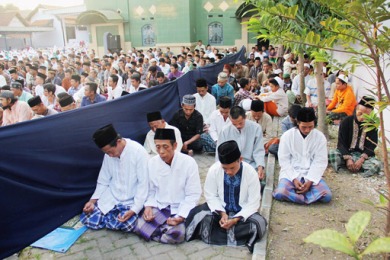Shia followers in Bandung, West Java, have filed a protest with local authorities over a planned declaration by the Anti-Shia National Alliance, scheduled for Sunday, fearing that the event could incite hatred against Shiites.
“We cannot hate something that is not [physically] there,” chairman of the Indonesian Ahlul Bait Association (IJABI), Hesti Rahardja, said Saturday.
He expressed his fear that Sunday’s declaration would not so much create hatred against the Shia community as a whole, but more against individual Shia followers.
“We respect freedom of speech, but the statement has the potential to incite hatred,” he said, reiterating the importance of maintaining calm ahead of July’s presidential election.
“This spirit [of hatred] will surely spread. This is what we are concerned about.”
Hesti confirmed that IJABI had sent letters to the West Java Police, West Java governor and the commander of the Siliwangi Regional Military Command (Kodam) III to protest the planned Anti-Shia National Alliance declaration. “We do not object to the activity but to the statement of hatred,” Hesti said.
West Java Police spokesman Sr. Comr. Martinus Sitompul did not comment much on the issue.
“An activity that is held at a house of worship does not require a permit from the police,” he said on Saturday.
Previously, West Java Police chief Insp. Gen. M. Iriawan said on Friday that the police had not received any information about the event.
“There is no permit [for the event]. If they do not hold a permit, we will take the necessary action,” he said.
Human rights campaigners have also condemned the scheduled declaration.
“Our stance is firm: We condemn the movement because it’s a form of sectarianism that could [fuel] conflict,” said Ahmad Fuad Fanani of the Maarif Institute for Culture and Humanity.
Deputy chair of the Setara Institute for Peace and Democracy, Bonar Tigor Naipospos, also rejected the move, calling it “hate speech” toward a minority group, adding that hate speech was a crime according to the Criminal Code (KUHP).
Anti-Shia National Alliance head Athian Ali said the declaration was part of an agreement made during a National Ulema Meeting and the Indonesian Islamic Ummah in Bandung on April 22, 2012.
The organizing committee plans to make the declaration at Bandung’s Al-Fajr Mosque during the event, which is scheduled to run from 8:30 a.m. through 12 p.m. Banners and posters for the event have been set up across the city in the past week. Athian added that more than 100 clerics were expected to join in the event.
The posters also refer to a number of Indonesian Ulema Council (MUI) figures due to speak on Sunday, including Abdul Muis Abdullah, chairman of the MUI Balikpapan chapter, and Muhammad Baharun, a member of the council’s central executive board.
Secretary of the MUI West Java chapter, Rafani Achyar, said the clerics attending the event did not represent the interests of any institution. “They are joining in a personal capacity.”
As of Saturday, Rafani said the West Java MUI had not been officially notified or invited to the declaration event, adding that, therefore, it was unnecessary to send a representative.
So far, MUI has not stated its position over the declaration. Asked whether the event had the potential to spread hatred, Rafani said all responsibility lay with the organizing committee.
He called on people to be wise in responding to the event. “There is no need to become emotional. I hope no disturbances will occur,” he added.
West Java Governor Ahmad Heryawan also declined to say where he stood regarding the declaration, although he has confirmed that he will not be attending the event.
In Indonesia, Shia is a minority Islamic sect within the country’s Muslim-majority population, which is dominated by Sunni Muslims. Religious Affairs Minister Suryadharma Ali previously called Shia Islam heretical, saying that it deviated from principal Islamic teachings.
Persecution of Shia followers has escalated in the past few years. In 2012, Tajul Muluk, a Shia leader from Sampang, East Java, was sentenced to two years’ imprisonment for blasphemy.
In the same year, a mob set fire to dozens of Shiite homes in Sampang, killing two Shia followers and forcing hundreds of others to take refuge in Sidoarjo, around 100 kilometers away.
/129

